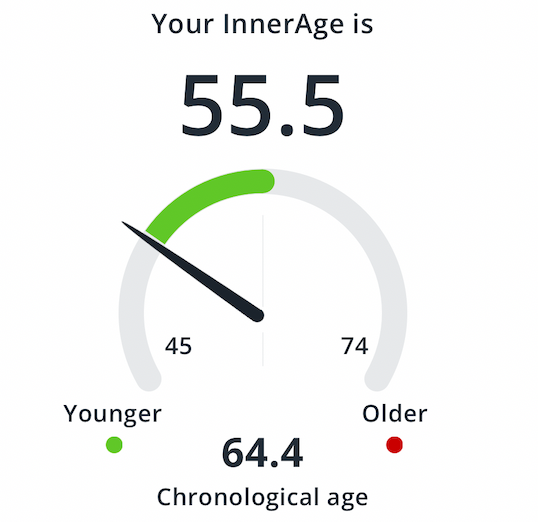One of the reasons I have regular bloodwork done is to make sure all my indicators are optimized or if there is anything that may need some attention. My latest InsideTracker continued to show an excellent biological age of 55 vs my chronological age of 64. However, one thing that stood out was that my cortisol has been steadily increasing over the last 3 years. I am going to be following the InsideTracker food- and behavior-based recommendations to see if I can get this number down. This is one of the reasons I use InsideTracker: it gives me actionable recommendations, rather than my doctor who may say, “We will keep an eye on this.” I prefer this more proactive approach and especially appreciate that it does not require medical interventions.
Cortisol is a hormone that the body releases in response to physical and emotional stress. It performs many important functions related to the regulation of energy, metabolism, and immune function. Cortisol levels naturally fluctuate throughout the day, with peak levels occurring in the morning and lower levels occurring at night. If cortisol levels stay elevated for an extended period of time, one may experience negative effects such as poor sleep quality, increased anxiety, depressed moods, digestive problems, reduced thyroid function, decreased bone density, loss of muscle tissue, imbalances in blood sugar, increased blood pressure, reduced immunity, and weight gain.

I have yet to feel these symptoms, but I want to course correct before I do. This is the key to modern health and wellness: take care of ourselves before we run into a bigger issue.
The most impactful recommendation on InsideTracker’s list for me is to take 600mg of ashwagandha in 2 daily doses of 300mg each. Additionally, it is recommended that I vary the duration and intensity of my aerobic routine, try to get a massage after exercise, and incorporate some yoga flow into my week. These are all pointed at reducing my body’s reaction to stress. I’ll also be upping my commitment to my meditation and breathwork practices. But let’s have a quick look at the ashwagandha recommendation, as it is the most impactful.
Ashwagandha has been used in Ayurvedic medicine for centuries. It is made from the roots of the plant Withania somnifera, which is mostly cultivated in India. It’s also referred to as King of Ayurveda, Indian Ginseng, and Wintercherry. It’s classified as an adaptogen, which is a substance that helps our body deal with the physical manifestations of stress. A large body of research has found that ashwagandha effectively lowers cortisol levels by up to 27%. While the exact mechanism for ashwagandha’s effects is unclear (like many adaptogens), some research suggests that ashwagandha directly inhibits the release of cortisol from the adrenal glands. Ashwagandha may also reduce the perception of stress, meaning that very stressful things don’t seem as bad when taking ashwagandha. So we get a bit of a chicken-and-egg effect, both less perceived stress and less biological reaction to stress.
I am testing again in early August to see what impact these have had and if there are any new indicators that will need my attention. Human biology is very much of a moving, changeable target. It would be comforting if everything stayed the same for years, but that’s just how it is. Having learned from some rather unpleasant medical surprises in the past, I keep regular track of the inner workings of my body. I liken it to having a dashboard on my car — it is good to know when it is low on oil, otherwise some pretty bad things will happen to the engine of the car.
Read more about Ashwagandha here.
From now until 6/20, InsideTracker is offering a buy one Ultimate Plan, get one free in honor of Father’s Day. Give dad the ultimate gift — a longer, healthier life.




Hello! Love your work.
I was just wondering if you tested your cortisol at the same time of day , for each blood test? As you tightly point out, these levels vary throughout the day.
Warmest regards,
Claire
Lisbon
Hi Claire,
Excellent question! Yes indeed, they do vary wildly during the day, which is something most people don’t realize. I have had mine taken at around 8am consistently, much should help mitigate the variations. I’ll retest in August and publish my test results to see if there is improvement. It may have just been a one off outlier, or it could be part of a trend. We will see.
Thanks for asking!
David